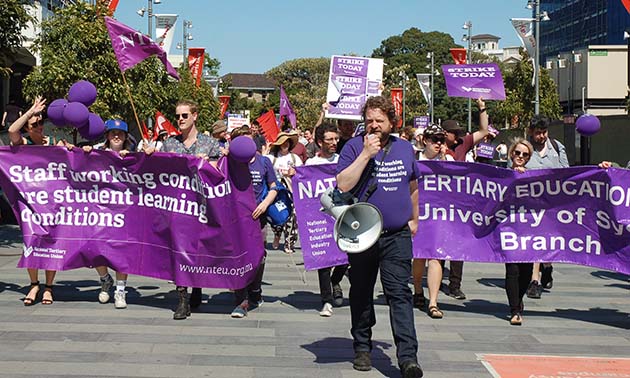After one of the most well-supported strike days and an enthusiastic vote for a 48 hour strike, the 301-139 vote to end this round of bargaining at USYD was a completely unnecessary setback. But the vote does not mean the end of the fight; we still need to stop casualisation and protect courses, jobs and conditions at USYD.
Rather than back the enthusiasm of NTEU members to fight for a better deal, the NTEU state and national offices went to extraordinary lengths to convince members to settle. In an unprecedented move, the NTEU even used the ACTU call-centre to cold call USYD members to get them to the meeting on 21 September to settle with management.
The NTEU national executive, as well as Queensland, Western Australia and NSW divisional secretaries issued statements urging us to settle, disregarding the USYD members’ unanimous resolution for a 48 hour strike. The offer management made on the day after our 48 hour strike vote was essentially no different from the offer we had rejected—the pay offer was too low; there was no clause to stop forced redundancies; and casuals still have no sick leave or equal superannuation.
Why the unseemly rush to settle?
There is no doubt we could have got more. Our campaign was just getting started. Two hundred and fifty more people joined the union since the start of the campaign. One of the best USYD strike days ever completely shut the university. Casuals were more involved in the campaign than ever.
Sydney University is one of the richest in Australia and could easily afford to pay a decent pay rise.
If the officials had put their support and confidence in the members’ determination and strength, the university management would have known there was state and national support behind our claims.
But our branch president was committed to settling and had even given the vice-chancellor an “in-principle” agreement before the members’ meeting. The NTEU general secretary, Grahame McCulloch, even flew into town to see the vice-chancellor.
If the national leadership had come to the USYD meeting to back the members’ action, it would have boosted the members’ confidence and sent a clear message to the university management that the union would fight for our core demands.
One of the reasons given for state and federal officials wanting USYD to settle is because of the threat that other universities could try the Murdoch option of applying to Fair Work to terminate their agreement and strip conditions back to the award. The best answer to the threat of the “Murdoch option” was always industrial action. Yet, the threat of the “Murdoch option” has been used to get members at other universities to settle for agreements that just maintained conditions.
The University of Western Australia, Edith Cowan and Curtin University have signed agreements. So have the University of Adelaide, ANU and Central Queensland. WSU and UTS are still bargaining.
Despite what the officials have said, there was never a risk that USYD would try the Murdoch option. The key to beating any Murdoch-style attempt to terminate agreements is a militant and confident union membership.
Keep Up the Fight
Perhaps the worst aspect of the university’s settlement offer is that there is no “no forced redundancy” clause. At USYD, hundreds of jobs are at risk.
We know that the university plans a major restructure in the lifetime of this agreement. We also know how management uses “spill and fill” to cut wages and jobs as casualization increases across the campus. Change management clauses didn’t save SCA. Jobs have also gone in Science and this month there have been redundancies, including the NTEU delegate, in the IT department.
The very limited improvement of extending the redeployment period from 12 weeks to nine months ends in 2019. It won’t stop people being forced to reapply for jobs at lower wages and does not apply to academic staff. Precarious employment is going to increase.
This is not the university we want.
Over the next period, there are going to be many disputes; the union will face many challenges to defend jobs and conditions, to defend subjects and courses; to fight funding cuts being pushed by the Turnbull government.
At every step we will need a union that is willing to rise to the challenge. We will need an NTEU that is willing to push the boundaries of the EA settlement. We need more open democracy and respect for membership decisions and we need greater accountability from those who are elected to the branch committee and the bargaining team—and, of course, from the state and national NTEU officials.
The settlement was a setback; but we can emerge stronger and more able to take on management if we learn the lessons, build the union, rely on the organised strength of the grass-roots membership and prepare for the battles ahead.
By Solidarity USYD NTEU members






